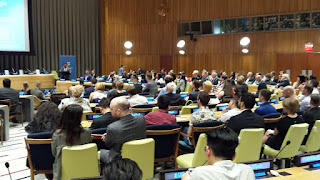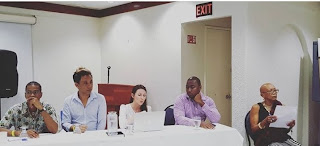Where are we?: LGBT Movement building in Belize
Posted March 3rd, 2013
Consider this an argumentative essay about the process of Movement Building in a developing country such as Belize. The essay is meant only to stimulate reflection. The lessons learned from section 53 has helped greatly to highlight the need for social analysis. What we at the United Belize Advocacy Movement discovered in our seven years of existence is our base is the lower middle-income and young L.G.B.T out of the closet individuals in the community, not the older heads or persons with connections or perceived connections. What we have learned is that while there is value in building allies, we are at a point where strategic partnership is external, not internal; that the upper middle has its place, but its not in a leadership role and that movement building, require debate, introspection of the community and investment in the cultivation of leadership as a base.
Movement building cannot ignore women and must recognized that the process can be impacting on those in the closet and frustrate those who are out the closet. Women however, must define their concerns and mobilize other women in a way that represent the new wave of the feminist movement in Belize as they sought to fight for Women's Rights. For too long lesbian women have been ignored because the HIV epidemic is presume to not impact them that discrimination is a minimal issue. What we have come to learn is that domestic violence; child rearing; cervical cancer; social isolation of mothers from daughters because of sexual orientation exists and that sexual and physical violence does exists, but in a different way that relates to the control of women's bodies. But I digress from the analysis.
In other movements, men may lead , but its the women who organized. For Belize, men may lead, but it is out lesbian women who may sustain the movement or at the very least, bring greater visibility and intersections between current women organization and other social concerns like crime and violence, domestic violence among others.The work we do in its original form may have been too ambitious, and such, create a divided between those who would see the work die or controlled vs those who would like additional social protection in legislation happen quickly.
We have discovered as well that there is political currency in allies, like families who are supportive of their relatives who are out vs families who are supportive, but prefers to stay quiet as they express fear of stigma unto themselves and family. Allies are an interesting lot, like our Brent Toombs and Reverend Mary Martin who have no problems issuing public statements. Two and counting. What does this say about the larger vision of having legislative outcomes. It means that we will have to be more sophisticated in our approach and recognize that L.G.B.T movement building requires a delicate balance in how we show political currency and reframing L.G.B.T issues.
It is clear however, the work will be challenged by those individuals who are public secrets that prefer to be highly critical about the process of movement building and indifferent about supporting the process; those who are public secrets who have no interest in doing public work and very little private work; those older heads who prefer the status quo of invisibility and no social action, but are highly critical and allies who may have a low threshold for advancing action beyond a communication approach of wearing wristband and having private conversation. While allies are supportive and will engage privately on issues of discrimination, it is clear that advancing the heavy lifting of advocacy will require a cultivation of new leaders from the younger generation. UniBAM in my mind, will be here for a time to advocate, advance leadership and rights-base education, but it is the next generation that will have to complete the work.
Section 53 in my mind while an opportunity for unification of a community, did not prepare the upper class and upper middle class sufficiently. In this regard, could be perceive as a threat to jobs, social routine and family. Many believe that life was fine and that no law needed change, but no one looked at the energies expended in staying in the closet, hiding relationships from family, on the restriction of public intimacy, at the indignities of starting over after living in a relationship for over 10 years, on the uncertainty of making health decisions and having it ripped away because there's was no recognition of investment in a relationship, of abuse spoken only in certain circles, but treated as a joke and never documented.
UniBAM was never just about section 53, it broad focus has always been health and rights. Health in HIV and AIDS, Sexual and Reproductive Health Services, HIV prevention and then it became about International Advocacy at the OAS, UN and in the national system like National AIDS Commission and looking at rights education for the community using the Yogyakarta Principles and crime and violence. It is clear UniBAM work must be influenced by resource mobilisation and a base.
In the ideal world, middle, upper and lower middle income individuals would be united with allies to advance stigma reduction strategies and legislative change with clearly defined roles. The problem is that the roles aren't clear, communal maturity has not peaked sufficiently to ensure legislative advancement occurs and communal vision is set presently at rum and party with very few proactively seeing the potential to organize rights-education sessions at their home on a weekly or monthly basis. Communal psychology seem to dictate parties; upper middle class individuals talking about doing; individuals being critical of communal processes that allow for feedback, but no commitment for investing personal time.
Social change, it seems, is a delicate process, so is communal perception and in dealing with recommendations. There are no easy answers, approaches or processes, but there are lots of opinions, indifference and criticisms. Some constructive, some destructive. The way forward is whether LGBT individuals see the current reality that it is the young and out who will drive this process and that individuals who are public secrets will need to move out the way for change to happen. How we get to the end of the journey, may challenge us, can the journey be allowed to move without resistance, criticism and indifference? It all debatable!
Consider this an argumentative essay about the process of Movement Building in a developing country such as Belize. The essay is meant only to stimulate reflection. The lessons learned from section 53 has helped greatly to highlight the need for social analysis. What we at the United Belize Advocacy Movement discovered in our seven years of existence is our base is the lower middle-income and young L.G.B.T out of the closet individuals in the community, not the older heads or persons with connections or perceived connections. What we have learned is that while there is value in building allies, we are at a point where strategic partnership is external, not internal; that the upper middle has its place, but its not in a leadership role and that movement building, require debate, introspection of the community and investment in the cultivation of leadership as a base.
Movement building cannot ignore women and must recognized that the process can be impacting on those in the closet and frustrate those who are out the closet. Women however, must define their concerns and mobilize other women in a way that represent the new wave of the feminist movement in Belize as they sought to fight for Women's Rights. For too long lesbian women have been ignored because the HIV epidemic is presume to not impact them that discrimination is a minimal issue. What we have come to learn is that domestic violence; child rearing; cervical cancer; social isolation of mothers from daughters because of sexual orientation exists and that sexual and physical violence does exists, but in a different way that relates to the control of women's bodies. But I digress from the analysis.
In other movements, men may lead , but its the women who organized. For Belize, men may lead, but it is out lesbian women who may sustain the movement or at the very least, bring greater visibility and intersections between current women organization and other social concerns like crime and violence, domestic violence among others.The work we do in its original form may have been too ambitious, and such, create a divided between those who would see the work die or controlled vs those who would like additional social protection in legislation happen quickly.
We have discovered as well that there is political currency in allies, like families who are supportive of their relatives who are out vs families who are supportive, but prefers to stay quiet as they express fear of stigma unto themselves and family. Allies are an interesting lot, like our Brent Toombs and Reverend Mary Martin who have no problems issuing public statements. Two and counting. What does this say about the larger vision of having legislative outcomes. It means that we will have to be more sophisticated in our approach and recognize that L.G.B.T movement building requires a delicate balance in how we show political currency and reframing L.G.B.T issues.
It is clear however, the work will be challenged by those individuals who are public secrets that prefer to be highly critical about the process of movement building and indifferent about supporting the process; those who are public secrets who have no interest in doing public work and very little private work; those older heads who prefer the status quo of invisibility and no social action, but are highly critical and allies who may have a low threshold for advancing action beyond a communication approach of wearing wristband and having private conversation. While allies are supportive and will engage privately on issues of discrimination, it is clear that advancing the heavy lifting of advocacy will require a cultivation of new leaders from the younger generation. UniBAM in my mind, will be here for a time to advocate, advance leadership and rights-base education, but it is the next generation that will have to complete the work.
Section 53 in my mind while an opportunity for unification of a community, did not prepare the upper class and upper middle class sufficiently. In this regard, could be perceive as a threat to jobs, social routine and family. Many believe that life was fine and that no law needed change, but no one looked at the energies expended in staying in the closet, hiding relationships from family, on the restriction of public intimacy, at the indignities of starting over after living in a relationship for over 10 years, on the uncertainty of making health decisions and having it ripped away because there's was no recognition of investment in a relationship, of abuse spoken only in certain circles, but treated as a joke and never documented.
UniBAM was never just about section 53, it broad focus has always been health and rights. Health in HIV and AIDS, Sexual and Reproductive Health Services, HIV prevention and then it became about International Advocacy at the OAS, UN and in the national system like National AIDS Commission and looking at rights education for the community using the Yogyakarta Principles and crime and violence. It is clear UniBAM work must be influenced by resource mobilisation and a base.
In the ideal world, middle, upper and lower middle income individuals would be united with allies to advance stigma reduction strategies and legislative change with clearly defined roles. The problem is that the roles aren't clear, communal maturity has not peaked sufficiently to ensure legislative advancement occurs and communal vision is set presently at rum and party with very few proactively seeing the potential to organize rights-education sessions at their home on a weekly or monthly basis. Communal psychology seem to dictate parties; upper middle class individuals talking about doing; individuals being critical of communal processes that allow for feedback, but no commitment for investing personal time.
Social change, it seems, is a delicate process, so is communal perception and in dealing with recommendations. There are no easy answers, approaches or processes, but there are lots of opinions, indifference and criticisms. Some constructive, some destructive. The way forward is whether LGBT individuals see the current reality that it is the young and out who will drive this process and that individuals who are public secrets will need to move out the way for change to happen. How we get to the end of the journey, may challenge us, can the journey be allowed to move without resistance, criticism and indifference? It all debatable!






Comments
Post a Comment